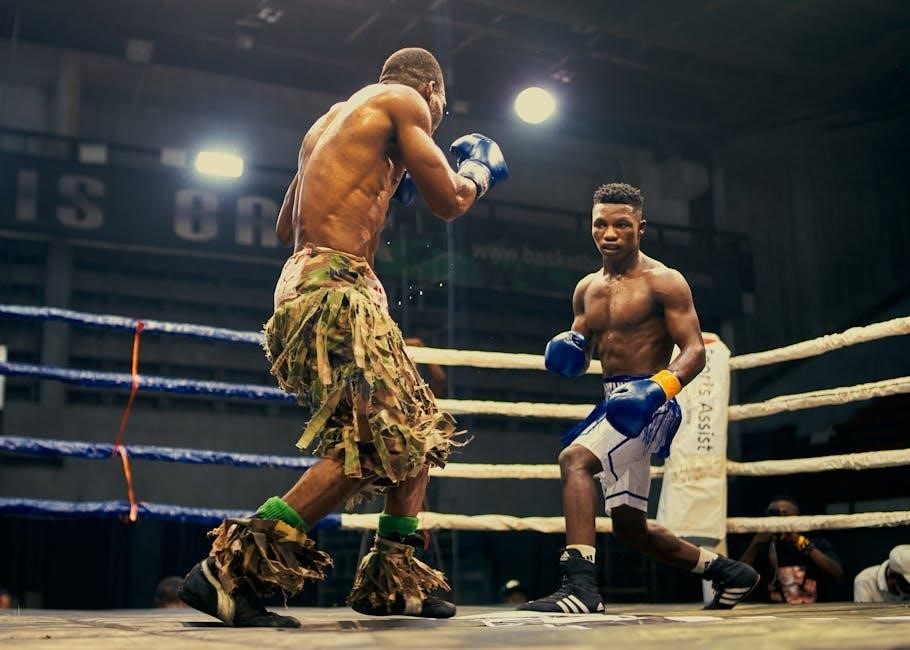topdog underdog pdf
Topdog/Underdog‚ written by Suzan-Lori Parks‚ is a Pulitzer Prize-winning play exploring themes of brotherhood‚ identity‚ and survival. The play follows Lincoln and Booth‚ two African American brothers navigating power dynamics and existential struggles. Available as a free PDF download‚ it remains a significant work in contemporary theater‚ offering a darkly comic yet profound examination of human relationships and societal hierarchies.
Overview of the Play and Its Significance
Topdog/Underdog‚ a two-actor play by Suzan-Lori Parks‚ delves into the complex relationship between two African American brothers‚ Lincoln and Booth. The play explores themes of identity‚ power dynamics‚ and survival‚ set against the backdrop of their shared struggles. Lincoln‚ the older brother‚ adopts the role of the “topdog‚” while Booth embodies the “underdog‚” creating a tense yet deeply human interplay. The title itself reflects the societal hierarchy and internal conflict between dominance and submissiveness. Parks’ vivid dialogue and nuanced characterization bring forth a darkly comic yet poignant narrative. The play’s significance lies in its unflinching examination of brotherly love‚ family legacy‚ and the search for self-definition. Its stripped-down structure and layered themes have made it a landmark work in contemporary theater. Since its Off-Broadway premiere in 2001‚ Topdog/Underdog has garnered critical acclaim‚ including the Pulitzer Prize for Drama in 2002. Its availability in PDF format has further expanded its reach‚ allowing readers to engage with this powerful story of resilience and sibling rivalry.
The Pulitzer Prize-Winning Recognition

Topdog/Underdog earned Suzan-Lori Parks the prestigious Pulitzer Prize for Drama in 2002‚ marking a historic achievement as she became the first African American woman to receive this honor. The play was recognized for its innovative storytelling‚ bold exploration of themes‚ and its impactful portrayal of brotherly conflict. The Pulitzer Prize solidified Parks’ status as a leading voice in contemporary theater‚ highlighting her ability to blend humor‚ tragedy‚ and social commentary. The award also drew widespread attention to the play‚ ensuring its place in the canon of American drama. The recognition underscored the relevance of Topdog/Underdog‘s exploration of identity‚ power‚ and survival‚ resonating with audiences and critics alike. This acclaim has made the play a frequently studied and performed work‚ with its PDF version readily available for readers and scholars to explore its profound themes and artistic brilliance.
Suzan-Lori Parks as the Playwright

Suzan-Lori Parks is a celebrated African American playwright‚ screenwriter‚ and novelist‚ known for her innovative and provocative works that challenge societal norms and explore the complexities of human identity. Born in 1963‚ Parks rose to prominence with her unique writing style‚ which often blends elements of poetry‚ drama‚ and social commentary. Her play Topdog/Underdog is a testament to her ability to craft deeply emotional and thought-provoking narratives‚ earning her widespread critical acclaim; Parks’ work frequently delves into themes of race‚ family‚ and power dynamics‚ offering audiences a fresh perspective on these issues. With a career spanning multiple mediums‚ she has solidified her position as one of the most influential voices in contemporary theater. Her writing is both accessible and profound‚ making her plays resonate with a diverse audience. The availability of Topdog/Underdog in PDF format has further expanded its reach‚ allowing readers to engage with her groundbreaking work in a convenient and accessible way.
Historical Context and Themes
Topdog/Underdog‚ set against a backdrop of unnamed time and place‚ explores universal themes of identity‚ power‚ and survival. The play delves into the complexities of brotherly love and rivalry‚ reflecting broader societal struggles. Suzan-Lori Parks uses the metaphor of “topdog” and “underdog” to examine hierarchies and dominance‚ both within the relationship between the two brothers and in society at large. Themes of economic hardship‚ race‚ and existential crises are woven throughout the narrative‚ offering a poignant commentary on the human condition. The play’s historical context is rooted in the African American experience‚ yet its themes transcend specific time and place‚ making it a timeless work. The availability of the play in PDF format has made it accessible for readers to engage with these profound themes‚ allowing for deeper analysis and reflection on the struggles and dynamics portrayed. Parks’ ability to blend humor and tragedy creates a rich‚ layered exploration of human relationships and societal structures‚ ensuring the play’s relevance across generations.

Availability of the Play in PDF Format

Topdog/Underdog by Suzan-Lori Parks is widely available in PDF format‚ making it accessible for readers and scholars worldwide. The play‚ recognized for its Pulitzer Prize-winning narrative‚ can be downloaded for free from various online platforms‚ allowing audiences to engage with its themes of brotherhood‚ identity‚ and societal hierarchies. Many websites offer direct links to download the PDF‚ enabling easy access to this significant work of contemporary theater. Additionally‚ the PDF version provides a convenient format for studying the play’s complex characters and dialogue‚ facilitating deeper analysis of its historical and cultural context. The availability of Topdog/Underdog in PDF has contributed to its popularity‚ ensuring its continued relevance and study in academic and theatrical circles. This accessibility underscores the playwright’s impact and the play’s enduring resonance with diverse audiences.

Key Themes and Analysis of “Topdog/Underdog”
The play explores themes of brotherly conflict‚ identity‚ and societal hierarchies through the rivalry of Lincoln and Booth. It delves into power dynamics‚ existential struggles‚ and the psychological tension between the “topdog” and “underdog” in their relationship and society.
The Struggle Between Brothers: Lincoln and Booth
The core of Topdog/Underdog lies in the volatile relationship between Lincoln and Booth‚ two African American brothers battling for survival and dominance. Their names‚ symbolizing their roles‚ reflect their internal and external conflicts. Lincoln‚ the “topdog‚” struggles to maintain control‚ while Booth‚ the “underdog‚” rebels against his subordinate position. Their dynamics are shaped by their shared history of abandonment and their relentless fight for identity and power. The play captures their constant power struggle‚ with Lincoln’s passive resistance contrasting Booth’s aggressive ambition. Their interactions are marked by tension‚ humor‚ and heartbreak‚ as they navigate a world where societal expectations and personal insecurities collide. This struggle is both a literal fight for resources and a metaphorical battle for self-worth‚ making their relationship a compelling exploration of brotherhood‚ competition‚ and the human condition. Available as a PDF‚ the play offers a profound look into their complex bond and its implications on their lives.

Exploring Identity and Family Dynamics
Topdog/Underdog delves deeply into the complexities of identity and family dynamics through the lives of Lincoln and Booth. Their names‚ symbolizing their roles as “topdog” and “underdog‚” reflect their constant struggle for power and recognition. The play explores how their identities are shaped by their shared history of abandonment and their attempts to redefine themselves. Lincoln‚ the older brother‚ grapples with his role as the perceived authority figure‚ while Booth challenges this dynamic‚ seeking to assert his own identity and escape the shadows of his past. Their relationship is fraught with tension‚ humor‚ and introspection‚ as they navigate the remnants of their family’s fragmented legacy. The play highlights how societal expectations and personal insecurities intersect‚ creating a complex web of brotherly love and rivalry. Through their interactions‚ Parks examines the ways in which identity is both self-defined and externally imposed‚ offering a poignant commentary on the human condition. Available as a PDF‚ the play provides a detailed exploration of these themes‚ making it a powerful read for those interested in family dynamics and personal identity.
The Concept of Topdog and Underdog in Society
The terms “topdog” and “underdog” in Topdog/Underdog serve as a metaphor for societal hierarchies and power dynamics. The “topdog” represents dominance‚ control‚ and societal privilege‚ while the “underdog” embodies oppression‚ marginalization‚ and resilience. Suzan-Lori Parks uses these concepts to explore how individuals navigate their roles within societal structures‚ often internalizing these labels. The play reflects the broader struggle of African Americans in a system historically designed to suppress their advancement. Frederick Perls’ psychological theory of the “topdog” and “underdog” as conflicting aspects of the personality further enriches this theme‚ suggesting that internal and external struggles are intertwined. The PDF version of the play highlights how these concepts are enacted through the brothers’ relationship‚ mirroring societal inequities. By examining these dynamics‚ Parks challenges readers to question and redefine their understanding of power‚ identity‚ and survival in a world where systemic oppression persists. The play’s exploration of these themes remains relevant‚ offering a powerful commentary on societal hierarchies and individual resistance.
Power Dynamics and Dominance

Power dynamics in Topdog/Underdog are central to the play’s exploration of brotherly conflict and societal oppression. Lincoln‚ as the “topdog‚” exerts control over Booth‚ the “underdog‚” reflecting broader power imbalances in society. This relationship is mirrored in their constant struggle for dominance‚ with Lincoln using emotional manipulation and Booth resorting to rebellion. The play highlights how these dynamics are shaped by historical and systemic oppression‚ particularly experienced by African Americans. Frederick Perls’ psychological concepts of the “topdog” and “underdog” further illustrate the internalization of these power struggles‚ where the “topdog” embodies control and the “underdog” represents submission. The PDF version of the play underscores these themes‚ showing how the brothers’ interactions reflect societal hierarchies. Suzan-Lori Parks examines how power is both a tool for survival and a source of conflict‚ questioning the legitimacy of dominance and the resilience of the oppressed. This exploration remains a powerful commentary on systemic inequality and individual agency‚ offering insight into the enduring struggle for power and identity.
Survival and Existential Struggles

Topdog/Underdog delves into the existential struggles of Lincoln and Booth‚ two African American brothers fighting to survive in a harsh world. The play portrays their daily battles‚ from finding food to navigating their troubled past‚ highlighting the fragility of existence. Their struggles are not just physical but deeply emotional‚ as they grapple with identity‚ abandonment‚ and the weight of their family’s legacy. The PDF version of the play reveals how Suzan-Lori Parks uses their interactions to explore themes of resilience and despair. Lincoln’s job as a Lincoln impersonator symbolizes the performance of identity‚ while Booth’s hustles reflect the desperation of living on the margins. Their shared trauma and constant power shifts illustrate the broader societal challenges faced by marginalized communities. Parks’ work questions the meaning of survival and whether it is possible to break free from cycles of oppression. The brothers’ existential struggles serve as a microcosm for the human condition‚ emphasizing the struggle to find purpose and dignity in a world that often denies it. Through their story‚ Parks offers a poignant commentary on what it means to survive and exist in the face of overwhelming adversity.

Language and Communication in the Play
Language and communication in Topdog/Underdog are central to the exploration of the brothers’ relationship and societal dynamics. Suzan-Lori Parks employs a rich‚ lyrical dialogue that reflects the rhythms of African American Vernacular English‚ creating a vivid oral tradition. The PDF version of the play highlights how language serves as both a tool for connection and a weapon for manipulation. Lincoln and Booth use words to negotiate power‚ with their conversations often layered with double meanings and unspoken tensions. Parks’ use of language underscores the brothers’ struggles with identity and their attempts to navigate a world that often silences them. The play’s dialogue also reveals the emotional depth of the characters‚ as they grapple with their past and present realities. Through their exchanges‚ Parks examines how language can both unite and divide‚ reflecting the broader societal tensions embedded in the narrative. The PDF format allows readers to closely analyze the lyrical and often poetic quality of the dialogue‚ emphasizing its role in conveying the play’s themes of survival and existential struggle.

